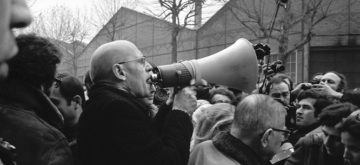
Michael C. Behrent in Dissent:
Suddenly, it seems, everyone has a lot to say about Michel Foucault. And much of it isn’t pretty. After enjoying a decades-long run as an all-purpose reference point in the humanities and social sciences, the French philosopher has come in for a reevaluation by both the right and the left.
The right, of course, has long blamed Foucault for licensing an array of left-wing pathologies. Some conservatives have even made Foucault a catchall scapegoat for ills ranging from slacker nihilism to woke totalitarianism. But a strange new respect is emerging for Foucault in some precincts on the right. Conservatives have flirted with the notion that Foucault’s hostility to confessional politics could make him a useful shield against “social justice warriors.” This presumption was strengthened during the COVID-19 pandemic, when Foucault’s critique of “biopolitics”—his term for the political significance assumed by public-health and medical issues in modern times—provided a handy weapon for attacking liberal fealty to scientific expertise.
As Foucault’s standing has climbed on the right, it has fallen on the left. A decade ago, left attention focused on whether Foucault’s discussions of neoliberalism in the 1970s suggested that his philosophical commitments harmonized with the emergent free-market ideology: hostile to the state, opposed to disciplinary power, and tolerant of behaviors previously deemed immoral. (In full disclosure, I contributed to this debate.) Recently, the locus of the leftist critique has, like its conservative counterpart, shifted to cultural politics. Thus the social theorists Mitchell Dean and Daniel Zamora maintain that Foucault’s politicization of selfhood inspired the confessional antics of “woke culture,” which seeks to overcome societal ills by making the reform of one’s self the ultimate managerial project. At the same time, Foucault’s standing has suffered a debilitating blow in the wake of recent claims that he paid underage boys for sex while living in Tunisia during the 1960s. These charges have brought new attention to places in his writing where—like some other radicals of his era—he questioned the need for a legal age of consent.
More here.
